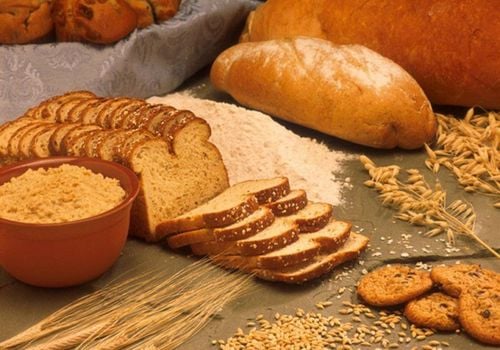This is an automatically translated article.
Posted by Master, Doctor Mai Vien Phuong - Department of Examination & Internal Medicine - Vinmec Central Park International General Hospital
Constipation is one of the most common digestive problems in the United States, affecting approximately 2.5 million people. It is defined as difficult, dry, or less than three bowel movements a week.
1. What causes constipation?
The main job of the large intestine is to absorb water from leftover food as it passes through your digestive system. It then produces feces (waste). The muscles of the colon eventually push the waste out through the rectum for elimination. If stool lingers for too long in the colon, stool can become hard and difficult to pass.
Poor diet frequently causes constipation. Adequate fiber and water intake are needed to help soften stools. High-fiber foods are often made from plants. Fiber comes in soluble and insoluble forms. Soluble fiber can dissolve in water and create a soft, gel-like material as it passes through the digestive system.
Insoluble fiber retains most of its structure as it passes through the digestive system. Both forms of fiber join the stool, increasing its weight and size while softening the stool. This makes it easier to pass through the rectum.
Stress, change in habits and conditions that slow down the contractions of your bowel muscles or delay your bowel movements can also lead to constipation.
2. What are the signs of constipation?
Everyone's definition of normal bowel movements can be different. Some individuals go three times a day, while others go three times a week.
However, you may be constipated if you experience the following symptoms:
Less than three bowel movements a week Hard, dry stools Straining or pain during bowel movements Feeling full, even after a bowel movement feeling of blockage in the rectum

3. Overview of the role of herbs for constipation
Constipation is annoying and makes life uncomfortable. When you feel heavy and bloated, you want quick relief. You can use natural remedies to relieve constipation.
Constipation is defined as having fewer than three bowel movements per week. It can be chronic or occur occasionally. Some of the symptoms include:
Hard stools Straining to have a bowel movement Feeling as if you are "congested" or unable to have a bowel movement Need help emptying your rectum Abdominal pain Nausea and bloating Using measures Herbal remedies
It is quite easy to find herbal remedies for constipation. In fact, many over-the-counter laxatives contain herbal ingredients. Most laxative herbs contain anthraquinones, or substances that stimulate the intestines. These laxatives work by drawing fluid to the colon and increasing bowel movements. Peristalsis is the contraction of the intestines that helps move matter through the colon to the rectum. Supplementing with fiber and fluids is essential when constipated.
Here are 5 herbal remedies you might want to consider for your constipation.
3.1. Cascara sagrada (buckthorn) This is a popular herbal laxative extracted from the bark of a species of buckthorn tree. This extract works by stimulating the colon enough to promote bowel movements. Short-term use is generally well tolerated, but may cause abdominal pain or electrolyte imbalance. Long-term use can cause liver damage ranging from mild to acute liver failure. Learn more about cascara sagrada.
3.2. Psyllium As a member of the plant species Plantain, psyllium is a natural fiber laxative that helps produce bulk stools. Psyllium is commonly used to treat chronic constipation and can be combined with other laxatives, both natural and synthetic. It can cause some side effects, such as:
Allergies Nausea Abdominal pain Vomiting

3.3. Rhubarb Although it may be best known as an ingredient in cakes, this vegetable is also used to treat constipation. Rhubarb has a laxative effect, but a study published in the Journal of Ethnopharmacology found it also has anti-diarrheal effects because of its tannin content. Therefore, rhubarb should only be used short-term for constipation.
3.4. Senna Senna is used to treat constipation and to clear the bowels before certain medical procedures. The fruit is said to be softer than the leaves. However, it should only be used for the short term and in the recommended dosage. Senna is effective against constipation and can be purchased at most drug stores. Long-term and high-dose use has been reported to cause liver damage.
3.5. Slippery elm This herb has a history of use for constipation. It stimulates the nerves in the gastrointestinal (GI) tract, which leads to mucus production and helps relieve constipation. Limited research has been done to determine long-term effects. Slippery elm contains sticky mucus, which coats the digestive tract. Therefore, it may decrease the absorption of some drugs if taken at the same time.
Some people believe that all herbs are safe because they are natural. While it is true that in some cases herbs are a gentler alternative, they are still potent and have the potential to cause drug interactions or negative side effects.
Talk to your doctor or pharmacist before using herbal remedies to treat constipation, especially if you are pregnant or breastfeeding. Children should be treated for recurrent constipation in consultation with a healthcare provider.

Vinmec International General Hospital is one of the leading hospitals in the country for examination, diagnosis and treatment of digestive diseases, specifically constipation. With modern equipment, sterile space, minimizing the impact as well as the risk of disease spread. Along with that is the dedication from experienced doctors who specialize in pediatric patients, making the examination no longer a concern for parents.
To be examined by experienced specialists at Vinmec. Please make an appointment at the website to be served.
Please dial HOTLINE for more information or register for an appointment HERE. Download MyVinmec app to make appointments faster and to manage your bookings easily.
References
Cascara (cascara sagrada). (2017). livertox.nih.gov/Cascara.htm Kumar D, et al. (2016). Natural polymers and herbal medicine based therapy for colonic diseases. florajournal.com/archives/2016/vol4issue3/PartA/4-6-5-393.pdf Mayo Clinic Staff. (2016). Constipation: Symptoms and causes. mayoclinic.org/diseases-conditions/constipation/symptoms-causes/syc-20354253 Senna (cassia species). (two thousand and thirteen). livertox.nih.gov/Senna.htm Qin Y, et al. (2011). The diarrhoeogenic and antidiarrhoeal bidirectional effects of rhubarb and its potential mechanism. DOI: doi.org/10.1016/j.jep.2010.11.041














